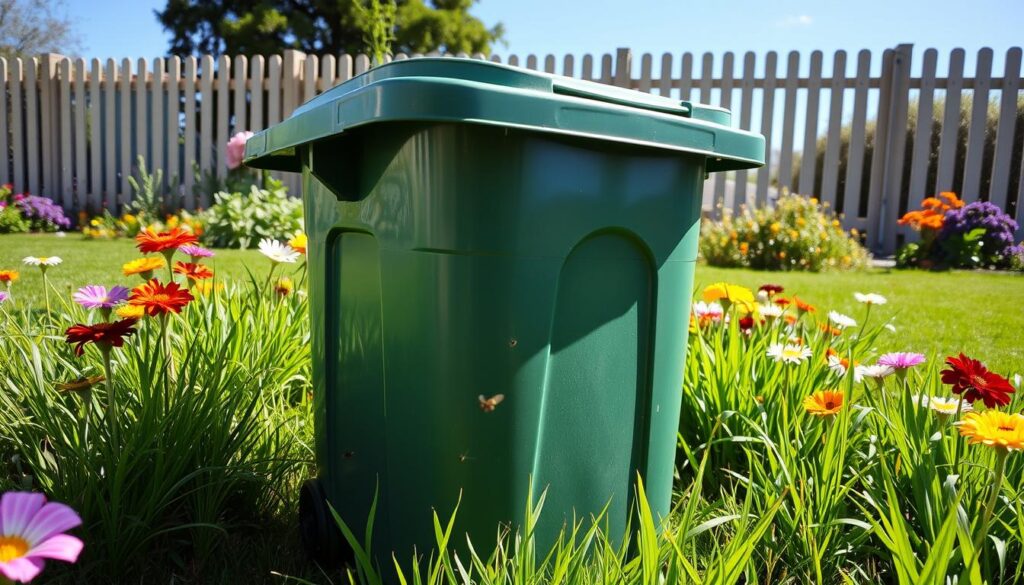Do you hate seeing maggots and flies around your wheelie bin?
You’re not alone.
Many homes face this problem.
But, your local council can help a lot.
They have many ways and tools to solve this issue. Your council’s waste team can guide you to keep your bin clean.
They can teach you how to stop flies before they start. They also offer professional cleaning services. This helps keep your bin and community clean.
But, where do you start?
First, find out why the problem exists. Then, work with your council to find the best solution for you.
Key Takeaways
- Your local council’s waste management team can provide valuable assistance in addressing wheelie bin fly problems.
- Councils have access to a range of strategies and resources to help residents tackle issues with maggots and flies in their bins.
- Preventative measures, professional cleaning services, and guidance on effective waste disposal can all be accessed through your council.
- By working with your council, you can find practical solutions to maintain a clean and hygienic waste management system in your community.
- Councils play a crucial role in promoting environmental sustainability and resource recovery through initiatives like recycling and composting programs.
Understanding the Problem: Maggots and Flies in Your Wheelie Bin
Maggots are unwanted in your wheelie bin. They are the young of flies. Flies lay eggs on rubbish, and maggots hatch in 24 hours. This means flies have been in your bin, likely because it was open or not sealed.
What Causes Maggots to Appear?
Several things can lead to maggots in your bin:
- Leaving your bin lid open lets flies in
- Not bagging food waste before putting it in
- Not emptying the bin often enough
- Warm weather makes maggots grow faster
To stop maggots, keep the bin lid closed.
Bag waste well.
Empty the bin regularly.
This helps keep maggots away.
“Around a third of all food purchased in the UK is thrown away, and more food is discarded than packaging in terms of weight.”
Keeping your bin clean helps avoid maggots. It also helps the environment. It supports local recycling and composting efforts.
Preventative Measures to Deter Flies and Maggots
Keeping your wheelie bin clean is important. It helps stop flies and maggots. Here are some steps to keep your bin clean:
- Always keep the bin lid closed. This stops flies from laying eggs. Eggs hatch into maggots in just 24 hours.
- Wrap food waste, nappies, and pet litter in double bags. This makes it hard for flies to find them.
- Make sure recycling is clean and dry. Wet or dirty items can attract maggots.
- Use a special bin for food waste. This makes it easier to manage flies and maggots.
- Keep your bin in a cool, shaded place. Heat makes flies and maggots breed faster.
Regular cleaning and disinfecting your bin is also key. Washing it after removing maggots helps. Using insect repellents can also keep flies away.
By following these steps, you can keep flies and maggots out of your bin. This makes waste management cleaner and smell-free for your home or business.
| Preventative Measure | Key Benefits |
|---|---|
| Keep bin lid closed | Creates a physical barrier to deter flies from laying eggs |
| Double-bag food waste | Reduces accessibility of organic matter that attracts flies |
| Clean and dry recycling | Eliminates food or liquid residues that can breed maggots |
| Dedicated food waste bin | Concentrates fly and maggot attraction in one bin |
| Store bin in cool, shaded area | Slows down the breeding cycle of flies and maggots |
By following these steps, you can keep flies and maggots out of your bin. This keeps your waste management system clean and hygienic.

Council Waste Management Strategies
Local councils in the UK are key in solving waste problems like fly issues. They start recycling more and composting food waste. This makes bins less likely to attract flies and reduces maggots.
Recycling Initiatives and Composting Programs
For example, Warrington Council’s recycling rate went up to 54% last year. Cutting black bin waste to two-weekly could boost recycling by 5%. Knowsley and others have done this, helping the environment and cutting waste.
St. Helens Council is also making big changes. They aim to recycle 50% of waste by 2026. They’ve cut household waste by nearly a third since 2006.
| Council | Recycling Rate | Waste Reduction | Composting Programs |
|---|---|---|---|
| Warrington | 49% to 54% | Reduced black bin waste collections to three-weekly | Encourages residents to compost food waste |
| Knowsley | 40.2% (goal: 50% by 2023) | Residential waste reduced from 754 kg to 523 kg per household | Processes organic waste at the Combined Heat and Power Energy from Waste facility |
Councils are key in making our environment better. They do this through recycling, composting, and rules for waste disposal.
Natural Remedies and Alternative Solutions
There are natural ways to keep flies away from wheelie bins. You can put herbs like lavender, mint, or citronella around the bin. Essential oils like tea tree or citronella can also help. Hanging insecticide strips inside the bin is another option.
Some people use boiling water, malt vinegar, or salt to kill maggots. But, it’s key to fix the problem’s root cause for lasting results. Councils in the UK are working hard to make waste management better.
Lancashire wants to recycle and compost 56% of waste by 2015. They aim to reach 61% by 2020. They also plan to reuse, recycle, and compost 70% of waste at Household Waste Recycling Centres every year.
The Waste Strategy for England 2007 has big goals. They want to recycle 50% of household waste by 2020. They also aim to reduce household waste by 45% and recover 75% of municipal waste by 2020.
Councils are doing more to help the environment. They plan to plant 2.5 million trees in Lancashire and Cheshire over 25 years. These efforts aim to cut down landfill waste and boost recycling and composting.

While natural remedies can help, fixing the problem’s root cause is key. Good waste management is crucial for lasting results in keeping wheelie bins fly and maggot-free.
Professional Bin Cleaning Services
If you’ve tried to stop maggots and flies in your bin but failed, think about professional bin cleaning services. They clean bins well and get rid of bad smells and pests.
They use special tools and cleaners to kill maggots and stop flies. Getting a professional service keeps your bin clean. This helps follow waste disposal regulations and environmental sustainability.
The Benefits of Professional Bin Cleaning
- Thorough cleaning and disinfection to eliminate odours and pests
- Specialised equipment and cleaning solutions for effective maggot and fly removal
- Compliance with council waste management guidelines and recycling initiatives
- Improved hygiene and reduced health hazards in your workplace or community
- Enhanced customer perception and community outreach campaigns
When picking a bin cleaning service, look for ones with good experience and a green focus. This means your bins will be clean and pest-free. It also helps reduce landfill and supports composting programs.
“Investing in a professional bin cleaning service is a wise decision for any business or community looking to maintain a healthy, hygienic, and environmentally responsible waste management system.”
Working with a trusted bin cleaning service makes hazardous waste handling easier. You can then focus on resource recovery methods that help your business and community.
Conclusion
Dealing with maggots and flies in your wheelie bin is tough. But, with the right steps and help from your local council, you can solve it. You can keep your bin clean and help your council’s goals for less waste.
Your council’s waste team is ready to help. They offer many resources and services. They aim to teach you how to waste less and use resources better.
By working with your council, you help your area’s waste system. This supports the council’s aims for less landfill, more recycling, and composting. Together, we can make the environment better for everyone.
